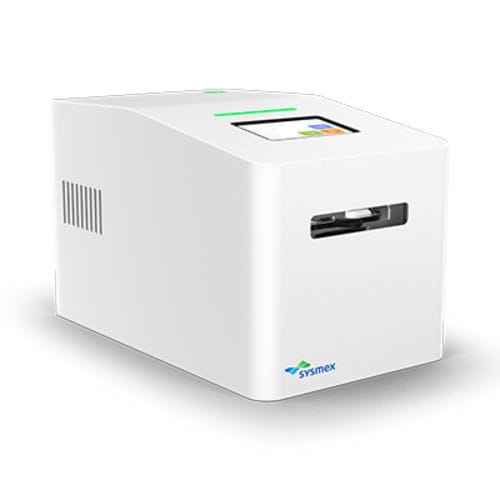
- Products
- Clinical diagnostic urine analyzer
- Sysmex Europe
POC urine analyzer PA-100 for clinical diagnosticbenchtopUSB
Add to favorites
Compare this product
Characteristics
- Operation
- POC
- Applications
- for clinical diagnostic
- Configuration
- benchtop
- Options
- USB
Description
Winner of the prestigious £8 million Longitude Prize for AMR research
Automated and rapid analysis of urine samples
Phenotypic AST, based on EUCAST standards
Straightforward: no sample pre-treatment and results during a patient’s first visit
Targeted antibiotic prescription in less than one hour – reduces risk of AMR
Antibiotic susceptibility testing for near-patient settings
Urinary tract infections (UTI) are one of the most common bacterial infections and also one of the driving causes of antibiotic prescription worldwide. Proper antibiotic prescription is generally achieved by performing urine cultures and antimicrobial susceptibility testing (AST) at the microbiology laboratory.
UTI patients are generally treated by their GP. Due to the limited availability of point-of-care diagnostics, empiric treatment is standard in many settings. Due to the high incidence of the disease, empiric UTI treatment fuels antimicrobial resistance (AMR). [1]
The PA-100 AST System is an automated analyser that combines phase contrast microscopy and nanofluidics to make available antibiograms, for the first time, at the point of care (POC). By using ground-breaking technology, we can achieve the most advanced phenotypic diagnostic performance possible.
Longitude Prize Winner for AMR
In response to the growing public health threat of Antimicrobial Resistance (AMR), often referred to as antibiotic resistance or superbugs, Sysmex’s PA-100 AST System was awarded the prestigious £8 million Longitude Prize on AMR. Established in the 18th century by the British Parliament, the Longitude Prize has a rich history of incentivising scientific breakthroughs to address critical challenges.
Catalogs
No catalogs are available for this product.
See all of Sysmex Europe‘s catalogs*Prices are pre-tax. They exclude delivery charges and customs duties and do not include additional charges for installation or activation options. Prices are indicative only and may vary by country, with changes to the cost of raw materials and exchange rates.

